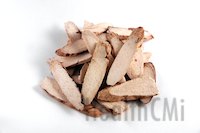Researchers at Xinjiang Medical University conclude that Shan Yao (Dioscorea opposita, wild yam) shows antihypertensive properties. Shan Yao reduced both systolic and diastolic blood pressure in laboratory rats with high blood pressure.  They were fed a water based solution of Shan Yao for 6 weeks. The researchers measured Shan Yao’s ability to inhibit endothelin converting enzyme and improve antioxidant activity. They suggest that Shan Yao’s ability to lower blood pressure may be due to these biochemical changes.
They were fed a water based solution of Shan Yao for 6 weeks. The researchers measured Shan Yao’s ability to inhibit endothelin converting enzyme and improve antioxidant activity. They suggest that Shan Yao’s ability to lower blood pressure may be due to these biochemical changes.
The research suggests that Shan Yao’s medicinal benefits are due, in part, to its effects on the kidneys. The researchers measured reductions of blood urea nitrogen (BUN) and serum creatinine (Scr) in the Shan Yao group over the control group. Based on these findings, the investigators conclude that Shan Yao improves renal function. Shan Yao demonstrated antioxidant properties. Lower MDA (malondialdehyde) and higher SOD (superoxide dismutase) levels were measured in the Shan Yao group.
The researchers conclude that Shan Yao “demonstrates significant antihypertensive effects” by reducing blood pressure and preventing left ventricular hypertrophy. The researchers suggest that Shan Yao prevents “cardiac hypertrophy by reduction of Ang-II level, inhibition of E-1 production, and induction of the in vivo antioxidant defense system.” Based on these findings, the research team formally proposes continued research into the antihypertensive effects of Shan Yao.
Reference:
Amat, Nurmuhammat, Raziya Amat, Sajida Abdureyim, Parida Hoxur, Zulpiya Osman, Dolkun Mamut, and Anake Kijjoa. "Aqueous extract of dioscorea opposita thunb. normalizes the hypertension in 2K1C hypertensive rats." BMC complementary and alternative medicine 14, no. 1 (2014): 36.

